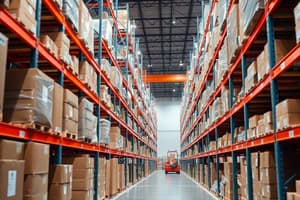Podcast
Questions and Answers
What is another term for physical distribution?
What is another term for physical distribution?
- Logistics (correct)
- Supply Chain Management
- Order Fulfillment
- Inventory Management
What are the four components of physical distribution?
What are the four components of physical distribution?
- Sourcing, Manufacturing, Marketing, and Sales
- Transportation, Warehousing, Inventory Management, and Order Processing (correct)
- Purchasing, Production, Packaging, and Delivery
- Recruiting, Training, Motivating, and Evaluating
What does a vendor refer to in the context of physical distribution?
What does a vendor refer to in the context of physical distribution?
- A supplier of products or services (correct)
- A warehouse management company
- A transportation company
- A inventory management software provider
What is a carrier in the context of physical distribution?
What is a carrier in the context of physical distribution?
What does inventory refer to in the context of physical distribution?
What does inventory refer to in the context of physical distribution?
How many modes of transportation are commonly used in physical distribution?
How many modes of transportation are commonly used in physical distribution?
Flashcards are hidden until you start studying
Study Notes
Physical Distribution and Logistics
- Physical distribution is also referred to as logistics.
- The four components of physical distribution are:
- Transportation
- Warehousing
- Inventory management
- Order processing
Vendors and Carriers
- Vendors are suppliers or sellers of products or services.
- In the context of physical distribution, vendors refer to the suppliers of products being transported and distributed.
- A carrier is a company or individual responsible for transporting goods from one location to another.
- Examples of carriers include:
- Shipping companies
- Trucking companies
- Courier services
Inventory Management
- Inventory refers to the stock of products or materials held by a business for sale or production.
- Inventory includes both:
- Finished goods ready for distribution
- Raw materials
Modes of Transportation
- There are five modes of transportation commonly used in physical distribution:
- Road (trucks)
- Rail
- Air
- Water (ships)
- Pipeline
- Advantages and disadvantages of each mode of transportation:
- Road (trucks):
- Flexibility and accessibility
- Traffic congestion and limited capacity
- Rail:
- Cost-effective for long distances
- Limited accessibility and fixed routes
- Air:
- Fast and efficient for long distances
- Expensive and limited capacity for bulky goods
- Water (ships):
- Cost-effective
- Slow and dependent on weather conditions
- Pipeline:
- Not mentioned in the provided text
- Road (trucks):
Studying That Suits You
Use AI to generate personalized quizzes and flashcards to suit your learning preferences.




